Does Paris Open a Door for Putin?
The events in Paris may provide an opening for President Vladimir Putin to overcome Russia’s international pariah status, but much will depend on how Europe and the United States respond to his overtures.
The events in Paris may provide an opening for President Vladimir Putin to overcome Russia’s international pariah status, but much will depend on how Europe and the United States respond to his overtures.

Russia essentially has been an outcast nation ever since its annexation of Crimea in February 2014 and subsequent military engagement in eastern Ukraine. The United States and the European Union (EU) imposed sectoral sanctions on Russia that, combined with the collapse of price of oil, have thrown the country into a deep economic recession. On several occasions, Putin has tried to change the Ukrainian narrative both at home and abroad, most recently through his aggressive actions in Syria. But while Russia demonstrated an increased military capability, the world generally has been unmoved by Putin’s actions; the bombing to date has not changed any fundamental facts on the ground, other than to throw a lifeline to Assad.
After the events in Paris, however, Putin may find a much more receptive audience.
Putin justified his actions in Syria by playing the terrorism card: in order to prevent terrorist attacks at home, Russia needed to confront the enemy on foreign territory. Putin further raised the threat of Russian citizens fighting with ISIS in Syria and then returning home to conduct terrorist operations inside the Russian Federation. To meet the global threat of terrorism, Putin called for the creation of an international coalition to fight ISIS under the auspices of a United Nations (UN) Security Council resolution.
Putin’s words largely were dismissed based on his own contradictory track record in international affairs. Indeed, it is difficult to reconcile Putin’s argument that the nation-state needs to be defended in Syria yet openly disregarded in Ukraine.
As Putin’s meetings at the G20 indicate, Russia’s period of isolation may be coming to an end
The attack in Paris now changes the parameters of the discussion, with the fight against terror potentially eclipsing the ongoing political stalemate in Ukraine. The tragic events in Paris coincided with the G20 meeting in Turkey, where doors that previously had been closed suddenly flew open. Putin, for example, met with Prime Minister David Cameron, and after the meeting, Putin spoke of a revival of British-Russian relations. Most significantly, Putin joined President Barack Obama on the sidelines of the G20 summit after it had been initially reported that the two leaders would not meet in Turkey. Unlike previous conversations, the accompanying photos showed two leaders engaged in serious discussion, as opposed to looking like they both wished that they were somewhere else. Moreover, according to the Guardian, the two presidents reached an agreement that the UN would mediate negotiations between the Syrian opposition and the regime after a ceasefire.
The practical meaning of that agreement remains unclear, but as Putin’s meetings at the G20 indicate, Russia’s period of isolation may be coming to an end. Much will depend on Russia’s next moves; there have been plenty of “I told you so’s” in the Russian press in response to the Paris terrorist attack, as well as strong criticisms of Western values and notions of tolerance as the underlying reason for the violence in Paris.
Putin could still overplay his hand. Yet the values gap may be shrinking in the aftermath of the Paris attack, and President François Hollande has already called for a rapprochement between the United States and Russia to form a joint alliance against ISIS.
The suggestion of a possible reconciliation with Russia undoubtedly will raise alarm bells in parts of Europe, particularly in Ukraine. Ukraine considers itself to be a victim of violence, aggression, and terror, with Russia serving as the primary perpetrator. The EU and the United States have supported Ukraine primarily through the imposition of economic sanctions, closing Western capital markets to Russian state-owned banks and major energy companies.
Will the global fight against ISIS—and Russia’s possible inclusion in that struggle—lead to a reevaluation of the sanctions regime? That question now appears to be on the table and is particularly relevant for the EU, which must unanimously extend sanctions against Russia every six months. The next extension must be approved by January 2016, and initial reports indicated that the sanctions would be renewed. After Paris, however, such an extension may no longer be a sure thing. Even if it is granted this time around, Ukraine runs the risk that, in reaction to calls for a united front against terror, the mood may change in Europe and the sanctions may disappear sooner than anticipated.
In his UN speech in September 2015, President Obama promised that he would not trade Ukraine for Syria. That may still be his intention, and Ukraine and its supporters will hold him to his word. Nevertheless, the events in Paris—following on the heels of major terrorist attack against Russia with the downing of Metrojet Flight 9268 at the end of October—will increase pressure for a significant and unified response.
Putin stands in the wings, ready to join the struggle, but on his own terms and conditions.
The opinions expressed here are solely those of the author.


The Kennan Institute is the premier US center for advanced research on Eurasia and the oldest and largest regional program at the Woodrow Wilson International Center for Scholars. The Kennan Institute is committed to improving American understanding of Russia, Ukraine, Central Asia, the South Caucasus, and the surrounding region through research and exchange. Read more



